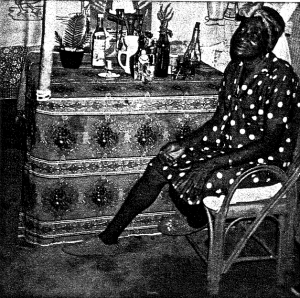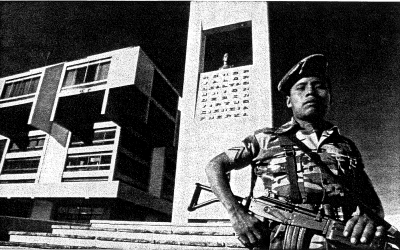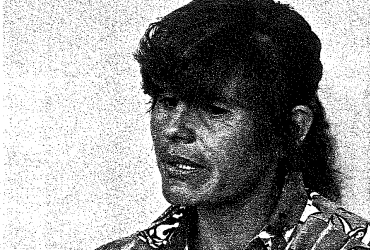Black or Mulata?
Reading Woman in Contemporary Cuban Culture

Santería: one of the many voices of Black Cuban women. Photo by
After my graduation from Yale in the early eighties, I spent several years of research and writing on the novels by Latin American authors. These investigations resulted in my book, José Donoso’s House of Fiction (1995).
But I found myself drawn to the culture of my native Cuba, and in summer, 1995, I attended a theoretical workshop led by Cuban novelist and critic Antonio Benítez Rojo at the Caribbean Writers Summer Institute at the University of Miami. That summer was very formative in the formulation of my current research, “Mulata/Black Woman? Reading Woman in Contemporary Cuban Culture,” which I am developing this academic year as a book-length project at the W.E.B. Du Bois Institute for Afro-American Research at Harvard. This extremely supportive environment is allowing me to dedicate myself to research and writing, to examine the changing images of women in Cuban cultural imagination and to relate it to my own experience as a Cuban woman.
I am exploring the ways in which Cuban writers and filmmakers since the 1960s have revised the stereotypical image of the mulata to transform her into a woman with a voice, capable of reconstituting her unrecorded historical involvement and her presence in the nation’s actual political and cultural realities. The literary figures of mulata and black woman encompass a wide-ranging array of issues involving authority, race, gender, and genre. These issues have always characterized cultural discourse in Cuba and other Caribbean countries, but appear to intensify in these literary and film interpretations, as I first discovered in the 1995 Miami workshop.
The theoretical framework provided by this workshop came alive in cultural and experiential terms for me in the summer of 1996 when I traveled to Cuba to participate in a two-week study program called “African Heritage in the Americas.” Headed by Professor Jualynne Dodson of the University of Colorado, the program aimed to give academics an in-depth introduction to African and Afro-Caribbean belief systems and cultures. Traveling through most of the island and meeting with Cubans of Afro-Cuban descent was an extraordinary experience. I got to talk with prominent women in the Cuban-Haitian community near Bayamo, to appreciate folk art developing out of the Santería religion, and to listen to the voices of the old and young.
My work with Afro-Cuban literature goes back to my interest in poetry and children’s literature. I became intrigued by the poetry of Excilia Saldañ, whose works are little known and rarely recognized in the United States. I recently published an article about her work in Afro-Hispanic Review and have given many papers on several of her major poems and stories. In addition, I have collaborated with the American poet Rosamond Rosenmeier on the translation of two of Saldañ’s extended poems, “My Name (A Family Anti-Elegy)” and “The Wife’s Monologue,” as well as a series of erotic letters. I’m now in the process of finding a publishing house for a bilingual anthology of her work in the United States.
The process of examining and translating Saldañ’s poetry and stories made me sensitive to the figure of the mulata in the Cuban cultural imagination. The image of the mulata–neither black nor white, but a unique blend–has been linked closely to the island’s national identity since the 19th century with Cirilo Villaverde’s novel Cecilia Valdés (1882),which characterized the mulata as perversely sexual and inherently disloyal and treacherous. If the literary figure of the mulata originated with Villaverde’s novel, that of the black woman became well-known through Nancy Morejón’s mythic poem, “Mujer Negra” (1979).
Reading the novels of Reinaldo Arenas and Jesús Díaz, and the poetry of Nancy Morejón and Excilia Saldañ, watching films by directors Sergio Giral and Sara Gómez, and exploring the work of artist Magdalena Campos-Pons, I begin to understand the tensions produced by the emergence of the figure of the black woman in contemporary Cuban culture. It is a new way of looking at African heritage, Cuban history, and at women as active participants in history and the future.
Flora Maria Gonzalez, an assistant professor at Emerson College in the Division of Humanities and Social Sciences, is a 1997-98 W.E.B. Du Bois Institute Resident Fellow at Harvard.
Related Articles
Interviewing Military Officers
We drove up into the residential hills of Villa Hermosa, overlooking the city of Guatemala, searching for the house amongst the many white-stucco, high-walled mansions. I asked the taxi-driver …
Disobedient Autobiographies of Las Desobedientes
From the quasi mythical conquista-age Malinche to contemporary women such as Rigoberta Menchú and Rosario Castellanos, Las Desobedientes restitutes the women of Latin American history …
Delivering the Data
Marta was 18, living at home in El Salvador, when she dated a man who raped her. She told her father about the rape, and he responded by threatening to kill her for damaging the family’s …




